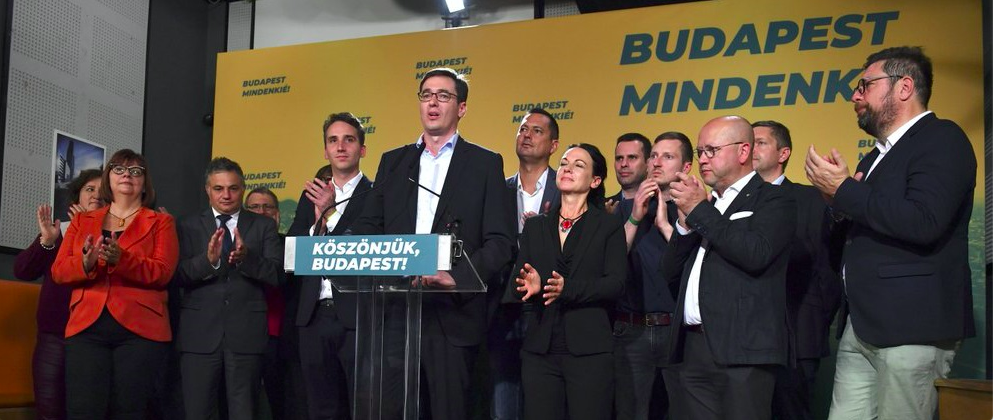Local elections were held all across Hungary last Sunday, voters were electing mayors and assembly members for 5 years. The Budapest mayor election was particularly significant for Hungary’s opposition, which scored an incredible victory against the ruling party (Fidesz) incumbent, István Tarlós.
“We have taken back Budapest” – the Hungarian opposition was cheering on Sunday night as their joint candidate, the liberal Gergely Karácsony won the mayoral race unseating the 71-year-old right-wing nationalist candidate, István Tarlós.
The Hungarian opposition has joint together with one goal: to weaken the Fidesz image as an invincible ruling party by running a single candidate, Gergely Karácsony who has been the mayor of District XIV (Zugló) for the past five years.
“A historic victory has been born today” – Karácsony started his press conference after the election results had been realised.
Since the Fidesz won a constitutional majority in the 2010 parliamentary elections, Prime Minister Viktor Orbán carried out constitutional amendments that allowed the government to control Hungary’s independent institutions and to tighten Orbán’s grip on power. The media is heavily state-controlled and advantages the ruling party. The independence of the judiciary remains a matter of concern as all members of the Constitutional Court were appointed by Fidesz. Orbán has repeatedly proposed that for Hungary ‘illiberal democracy’ is a desirable alternative to liberal democracy and referred to counties like China, India and Russia as potential models to follow. As a result, Orbán regularly clashes with the EU over migration and rule-of-law issues.
Last year, at the parliamentary election, the opposition was heavily criticized for failing to unite against Orbán and allowing the Fidesz party to win a supermajority for the third consecutive term. At the European Parliament election in May, Fidesz won 52.6% of votes but only 41.2% in Budapest which was a clear sign that Orbán’s party is less supported in the capital than in the countryside. The Hungarian opposition had certainly learnt its lesson from the previous elections and decided to rally behind a joint candidate to challenge the ruling party in major cities of Hungary.
“Changing Budapest and the major cities is the first step towards changing Hungary […]. We have given everyone a lesson on democracy. […] A united opposition, that voters had long been waiting for, was formed and the result tells us this is the path to take going forward” – the pro-EU Karácsony told the celebrating crowd. He pledged to carry out their promises “to build a transparent, decent, green and solidary city at the heart of Europe” in cooperation with Brussels and “take the city from the 20th century to the 21st century”.
What is genuinely impressive, is that despite a lack of resources compared to the ruling party and restricted access to mass media, the opposition was able to rely on social media and a grassroots street campaigning to succeed. This victory signals that Hungarians have started to have enough of Orbán’s ‘illiberalism’.
While the results of the mayoral elections will not affect Orbán’s grip on national power, as his nationalist party remains wildly popular in rural areas, they certainly show that there are boundaries to Fidesz’s power in Hungary. In 10 out of 23 major cities, including Szeged, Eger and Miskolc, the opposition won the elections. These results prove that a united opposition strategy of running behind a joint candidate against Fidesz could offer a serious challenge to Orbán at the next general election in 2022.
Felicia Szloboda is currently doing a MSc in Human Rights and Diplomacy at the University of Stirling in Scotland. Her main interests include researching the rise of ‘illiberalism’ in Europe, democratisation, human rights and international development.
Twitter: @FeliceS023

